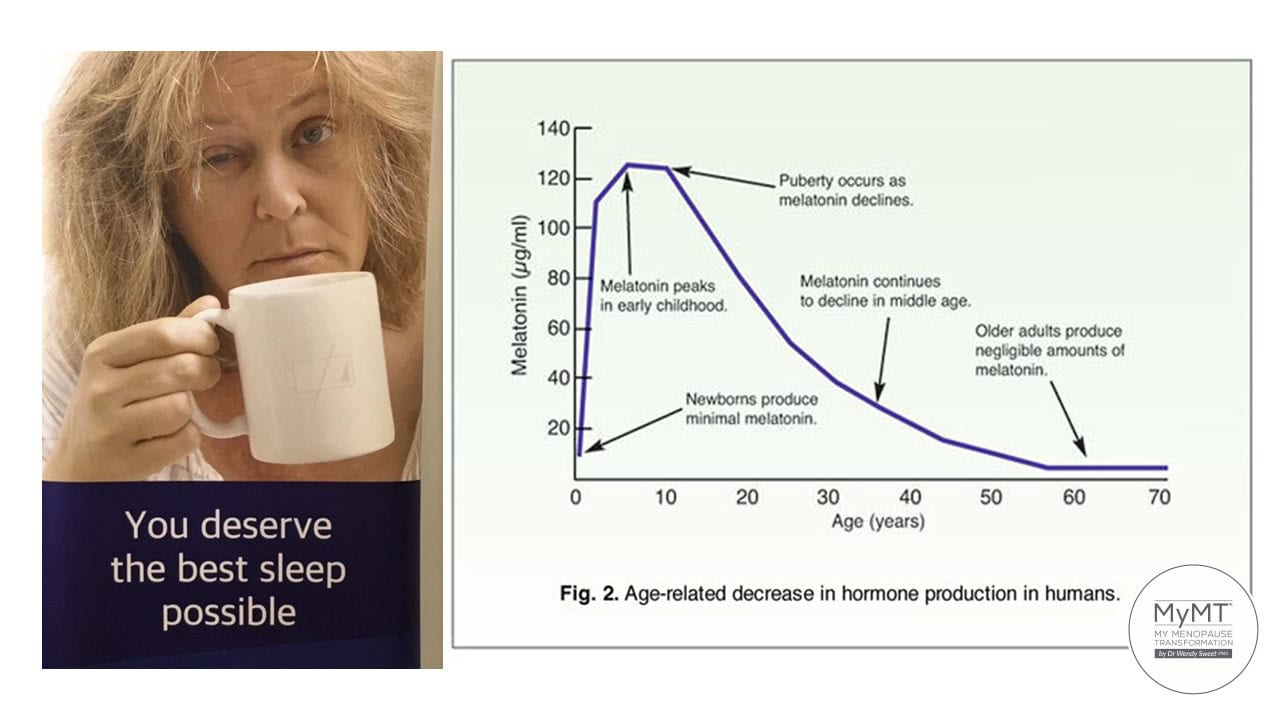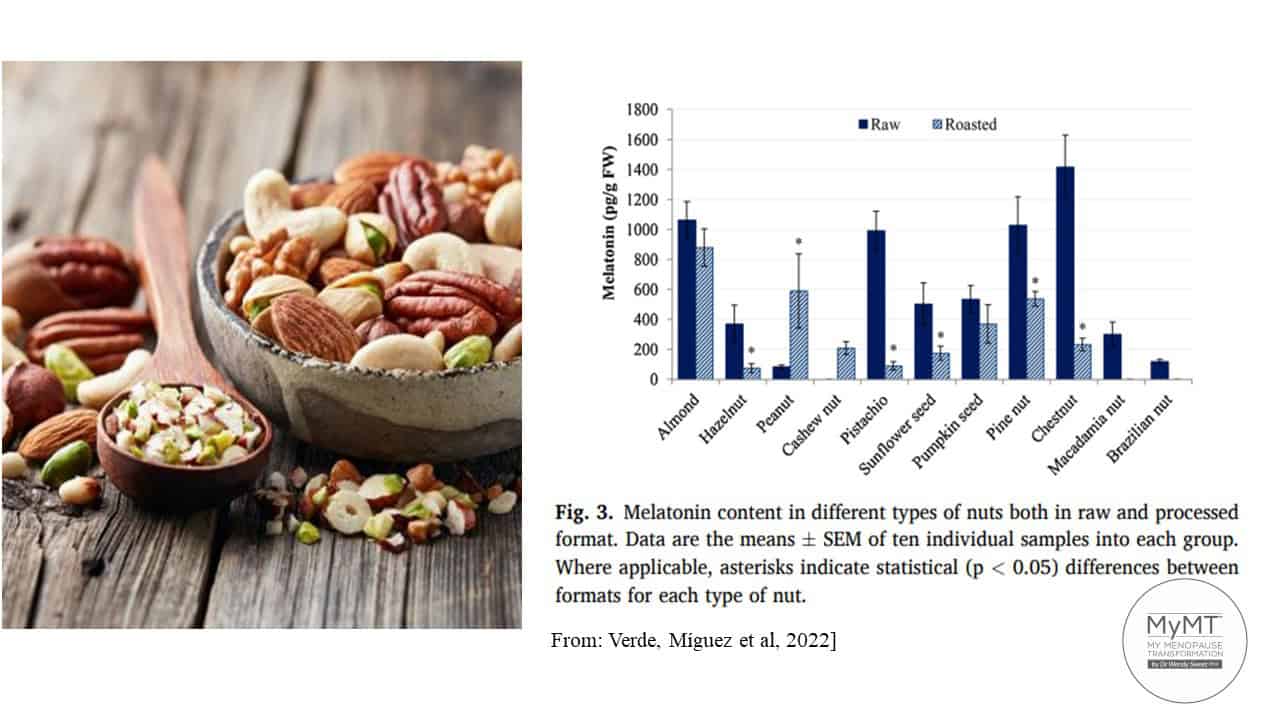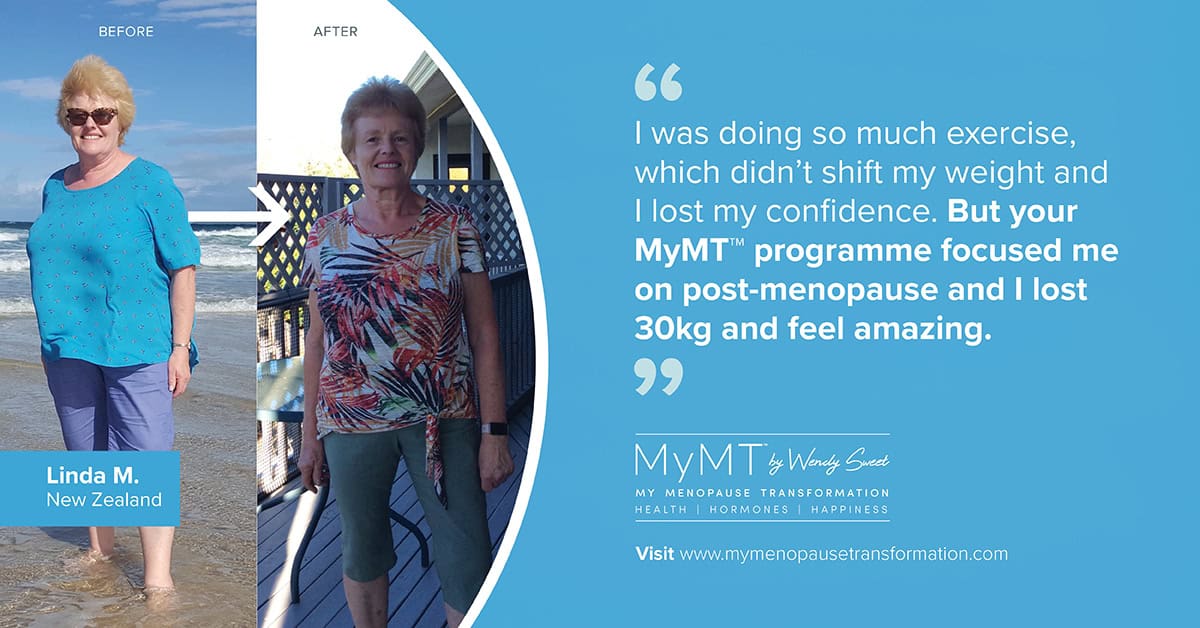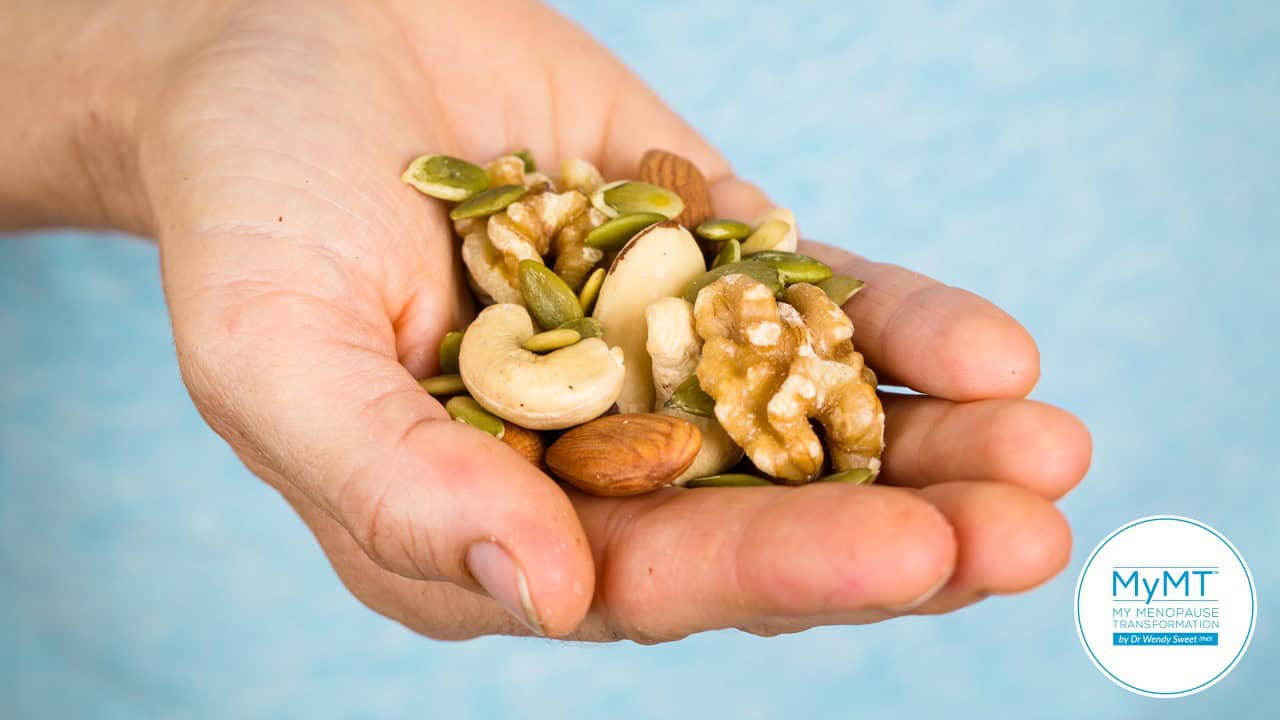As you grab those Easter eggs this weekend, or that block of chocolate at the supermarket, can you also wander around to the aisle which has nuts … especially if you aren’t sleeping during menopause?
A handful a day – that’s all you need. But they must be raw or roasted, preferably as fresh as possible and not heavily processed. When you get home, you need to store them in a dark, cool place and if you can tolerate the skin being on them, then this is important too.
You see, nuts, especially walnuts, pistachios and almonds, contain melatonin.
If you’ve been lying awake at night, frustrated and tired, when everyone else in the household is sleeping soundly, you have probably thought about melatonin levels in your body. This is one of our sleep hormones and in menopause as we age and oestrogen begins to decline, melatonin levels naturally decline.
Whilst we can’t do anything about this natural phase of ageing, what we need to do is to slow down the rate of decline of our precious melatonin. Eating a handful of the right type of nuts is just one way to do this and if you can add walnuts to your dietary intake, then eating these also have powerful cardiovascular benefits for women as well.

Nuts are named because they share the characteristic that in their natural composition (without human manipulation), they contain less than 50 % water. Rich in vegetable proteins and fats, mostly unsaturated fatty acids (the ‘good’ fats), they are a great source of dietary fibre as well as providing a wide range of nutrients, such as vitamins (folic acid, niacin, tocopherols, vitamin B6, etc.), minerals (calcium, magnesium, potassium, etc.) and many other bioactive components, such as phytosterols. [Verde, Miguez et al, 2022].
Insomnia is a serious problem, and whilst both men and women experience insomnia, women in their 50s and older tend to experience it more than men. If you’ve been awake whilst your male partner is asleep and snoring, you get what I mean.
Ever since insomnia and ageing are known to be connected, researchers have been learning more about whether melatonin-rich foods could assist our precious sleep. Melatonin has been reported to improve sleep efficiency and it was found that eating foods rich in melatonin, can help us to get off to sleep.
Melatonin has now been identified and qualified in various foods from fungi to animals and plants. Eggs and fish are higher melatonin-containing food groups in animal foods, whereas in plant foods, nuts such as walnuts and pistachios have the highest content of melatonin. Some types of mushrooms, cereals and germinated legumes or seeds are also good dietary sources of melatonin.

But there’s more to the story about nuts and our health as we age and this has to do with cardiovascular health, especially as we move into post-menopause.
Women consuming nuts at midlife have a greater likelihood of overall health and well-being at older ages.
According to researchers in a large study of nut consumption in midlife women, eating walnuts may represent a simple intervention to explore and promote healthy ageing. In the Nurses’ Health Study (NHS), researchers reported that better diet quality and a greater dietary flavonoid intake at midlife were related to a greater likelihood of overall health and well-being in women as they age.
In over 33,000 middle-aged NHS nurses at the time of the study, researchers observed a significant association between consumption of nuts at midlife and healthy ageing. This was broadly defined across four domains – chronic diseases, mental health, and cognitive and physical function. When analyzing several specific types of nuts, walnut consumption appeared to have the strongest relation with healthy aging.
This is to do with the fact that nuts, including walnuts, help to lower Low-density lipoprotein (LDL) cholesterol – this is the unhealthy type of cholesterol that tends to increase in women as oestrogen levels decline. Nuts are high in the types of plant fats that help to boost healthy High-density lipoprotein (HDL) cholesterol instead.
These healthy fats are not only important for immune and cardiac health, but they help to transport fat-soluble vitamins around your body. These vitamins are A, D, E and K – all of which can be low in women as they transition menopause.
So, will you add some walnuts, pistachios and almonds to your daily diet? All of these types of nuts contain melatonin but they are also a valuable vegetarian source of the essential fatty acid omega-3. They contain iron, selenium, calcium, zinc, vitamin E and some B vitamins – all of which contribute to our energy levels as we transition through menopause.
And yes, whilst nuts are high in calories so some of you may be avoiding them, they are a rich source of protein including an amino acid called arginine. This can be converted to nitric oxide, which I’ve talked about in other articles and this helps to expand blood vessels, therefore, improving blood flow. Good to know if you are a regular exerciser.

When life gets hectic and we find that there’s not enough hours in the day to get things done, we often find that we grab whatever food that we can too. You’re not alone with this! But whilst our body is undergoing numerous physcial changes which may result in hot flushes, insomnia, sore joints, gut health concerns and other symptoms such as depression, many of these problems can be better managed with the right diet, exercise and of course, behaviour change support. Adding a handful of healthful nuts to our day is just one of these strategies.
As I often used to mention in my live-events, the future for all of us is to focus on our health as we age, especially if we already have some health changes that our menopause transition has bought to the fore. How to do this is what you learn in my 12 week programmes which this month are on SALE. Details are HERE.
There is so much confusion about food choices these days isn’t there? And that’s why I decided to put some research into how much food, what type of food and when we should be eating so that we all enter into our years beyond menopause as healthy as we deserve to feel. If you are confused and never want to go on another ‘diet’ every again, then please join me for 12 weeks when you can.
By positioning the MyMT™ programmes in women’s healthy ageing research, how we look after ourselves at this stage of life, makes so much sense. Walnuts are on the menu as are peanuts and pistachios, if you aren’t allergic to them, because as I often say, “Don’t look back, you aren’t going that way now.”

References:
D’Antono B, Bouchard V. (2019). Impaired sleep quality is associated with concurrent elevations in inflammatory markers: are post-menopausal women at greater risk? Biol Sex Differ. Jul 8;10(1):34. doi: 10.1186/s13293-019-0250-x. PMID: 31287027; PMCID: PMC6615113.
Jehan, S., Giardin, J-L, Auguste, E., et al (2017). Sleep, Melatonin and the Menopausal Transition: What are the links? Sleep Science, 10(1): 11-18.
Jehan, S., Masters-Isarilov, A., Salifu, I., Zizi, F., Jean-Louis, G., Pandi-Perumal, S. R., Gupta, R., Brzezinski, A., & McFarlane, S. I. (2015). Sleep Disorders in Postmenopausal Women. Journal of sleep disorders & therapy, 4(5), 212.
Kim, T. W., Jeong, J. H., & Hong, S. C. (2015). The impact of sleep and circadian disturbance on hormones and metabolism. International journal of endocrinology, 591729. https://doi.org/10.1155/2015/59172
Meng, X., Li, Y., Li, S., Zhou, Y., Gan, R. Y., Xu, D. P., & Li, H. B. (2017). Dietary Sources and Bioactivities of Melatonin. Nutrients, 9(4), 367. https://doi.org/10.3390/nu9040367
Verde, A., Míguez, J., Leao-Martins, J. Gago-Martínez, A., & Gallardo, M. (2022). Melatonin content in walnuts and other commercial nuts. Influence of cultivar, ripening and processing (roasting). Journal of food composition and analysis, 105, 104180. doi: 10.1016/j.jfca.2021.104180


